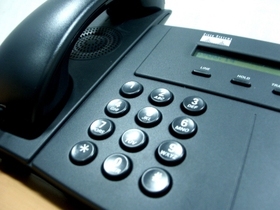Digital Systems vs. IP Phone Systems: Which is Right For Your Business
Remember a time when a phone was just a phone? Those days are long gone and today the choices for business communication are numerous. Currently, two popular choices are digital systems and IP phone systems.

There is one key difference between IP and digital business phone systems - and that is how the calls are made and received. IP phones send voice data via a data connection, i.e. the Internet; whereas digital business phones are a traditional phone system that makes calls through the land line.
Let's review the advantages and disadvantages of digital vs. IP phone systems:
- Cost
IP phones, also known as VoIP (Voice over Internet Protocol) are used by making calls over the Internet rather than through traditional phone lines. The main benefit is that call costs are generally lower. While some new hardware may be required for an office IP phone network, the costs are typically lower than the costs of maintaining a digital phone network.
Digital phones are less expensive initially to set up, but calls cost more. It is estimated that calls over IP phones average 40% less than digital phones for local calls and 90% less for international calls. - Mobility
A benefit of IP phones is that they are more portable than digital phones. You can move IP phones from one desk to another without losing the connection or extension number. If you move offices, simply plug the power and Ethernet cables back in at your new office. You'll be up and running immediately with the same numbers and extensions.
Digital phones utilize separate cables (network + phone cable) and it's not possible to move the phone(s) - even down the hall - without contacting the phone company to transfer your number to the new location. - Bandwidth
As IP phones rely on an Internet connection, the bandwidth will be shared between computers and phones in the office, which can result in one or both of them having slower performance. Consequently, if the Internet goes down, so will the phones. Digital phone systems function on a separate line, so Internet problems don't ever impact phone communication. It is possible to set up IP phone systems with back up Internet connections to decrease the likelihood of connection failure. - Power
In terms of operating costs, digital phones are more power-efficient. In fact, they barely use any power - most of it comes from the line itself. IP phones either need to be connected to an AC source or have a power over Ethernet injector, which can send power and data over the same network cable. - Maintenance
A great benefit of IP phones is they can be accessed remotely by anyone who has been given administrator access. This means that if there are any technical issues, you don't need to wait for a specialist to arrive on site, which can cut into productivity. If you have IT staff who can maintain your digital phones that is a significant advantage. Otherwise, delays are probable waiting for repairs.
To summarize, if you are a smaller business who prefers simplified communication and the separation of voice and data, digital phones can suit your needs. A larger business whose call volume is high and have a strong Internet infrastructure will benefit from a modern IP phone system.
Ready to Compare Business Phone Systems Price Quotes?